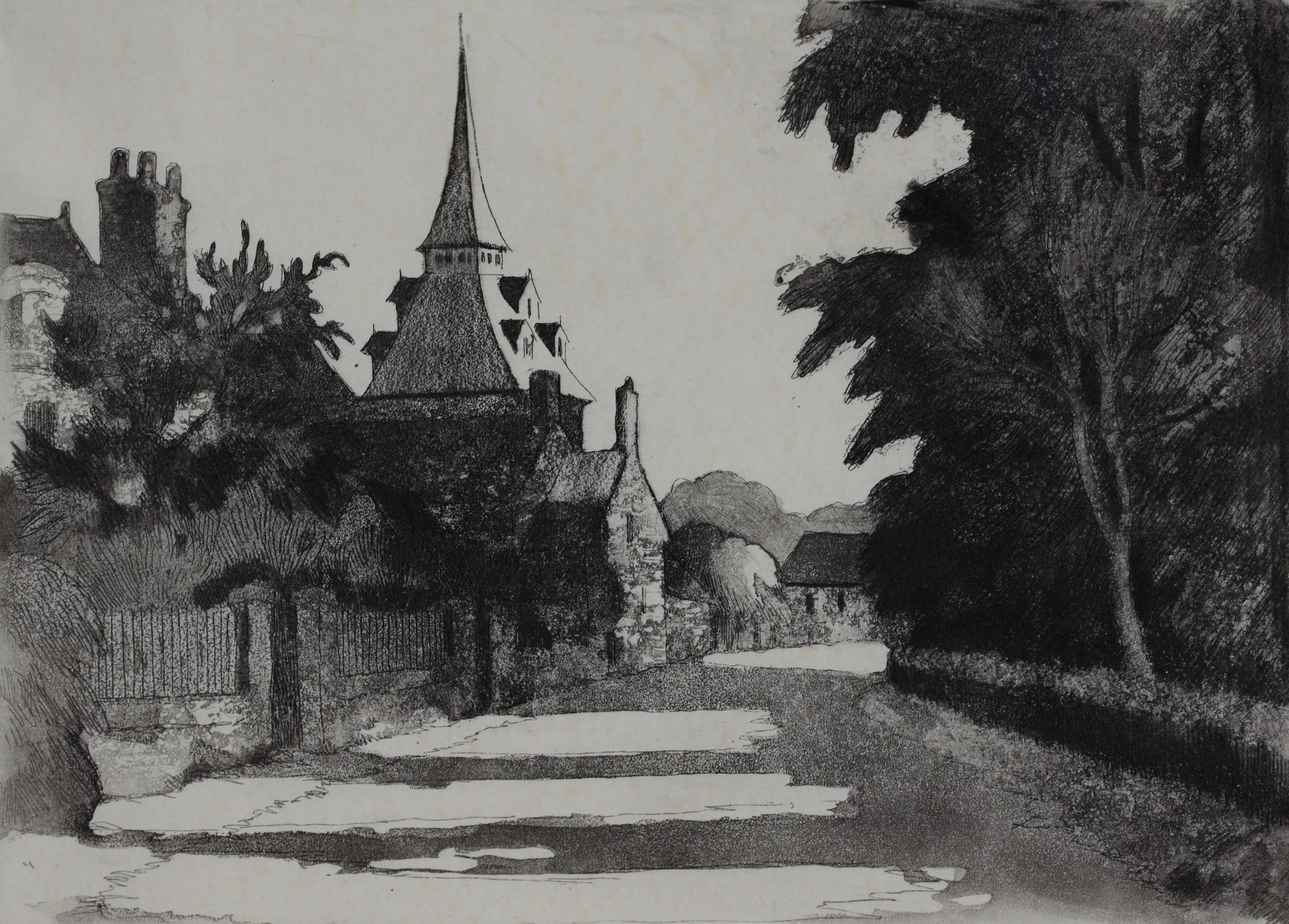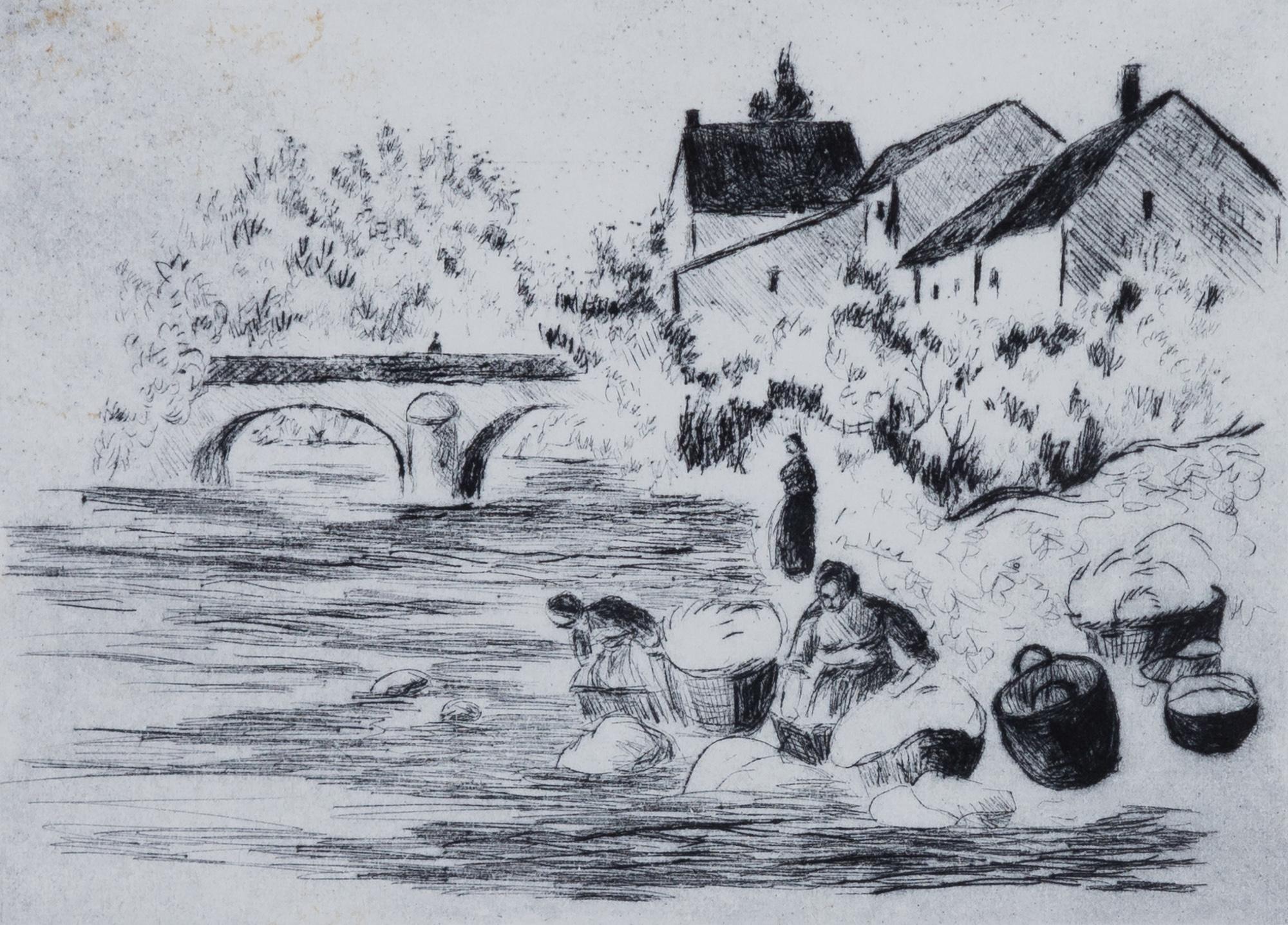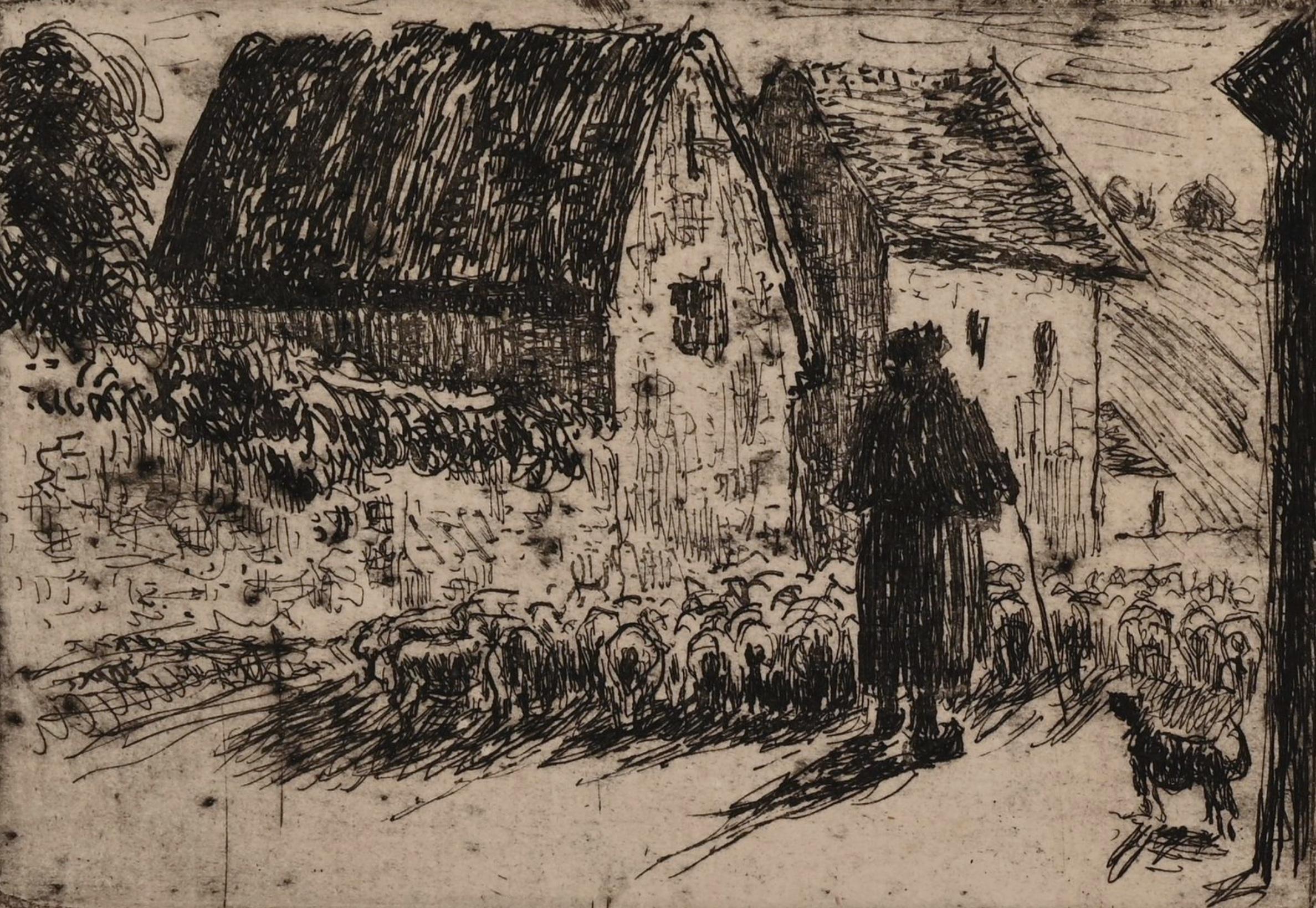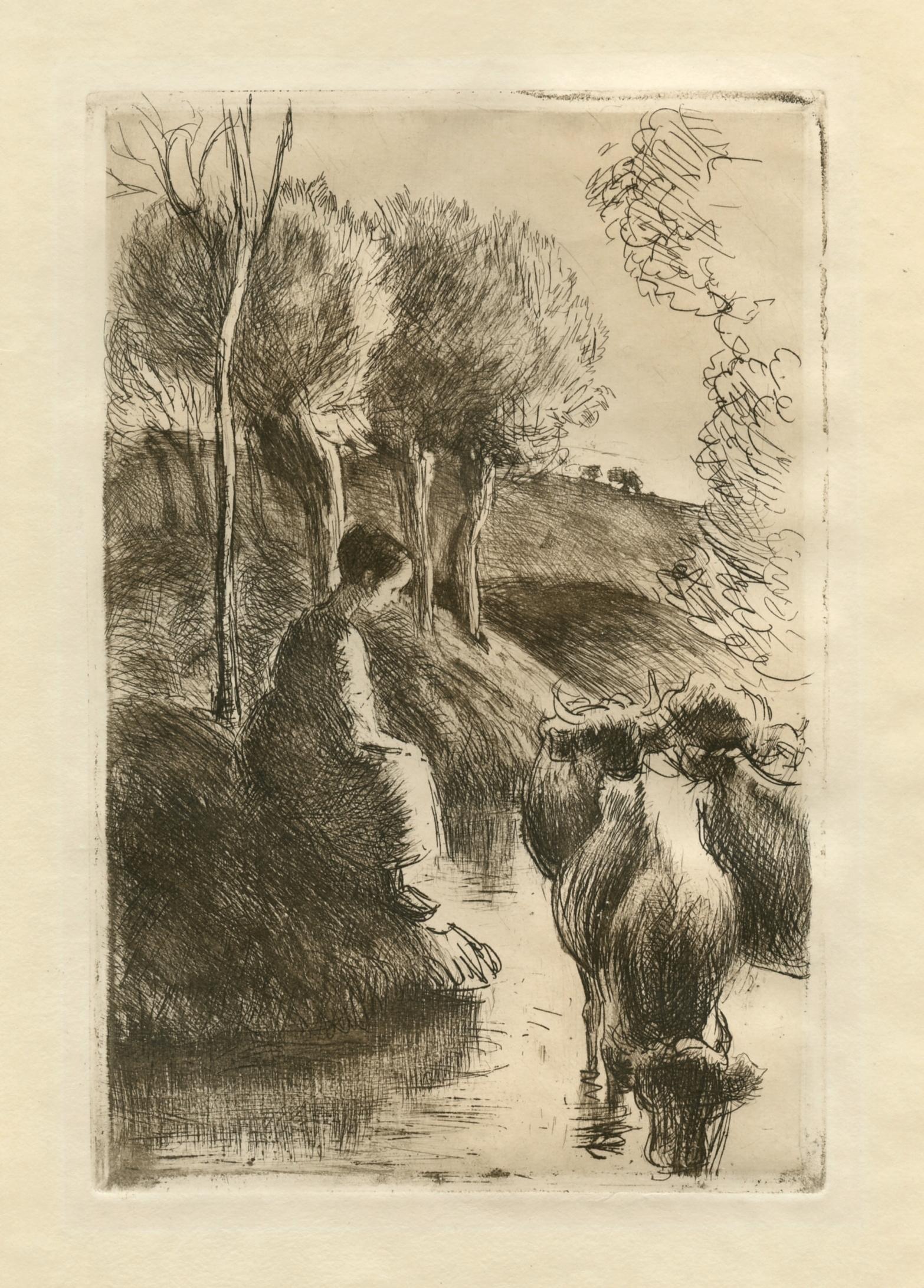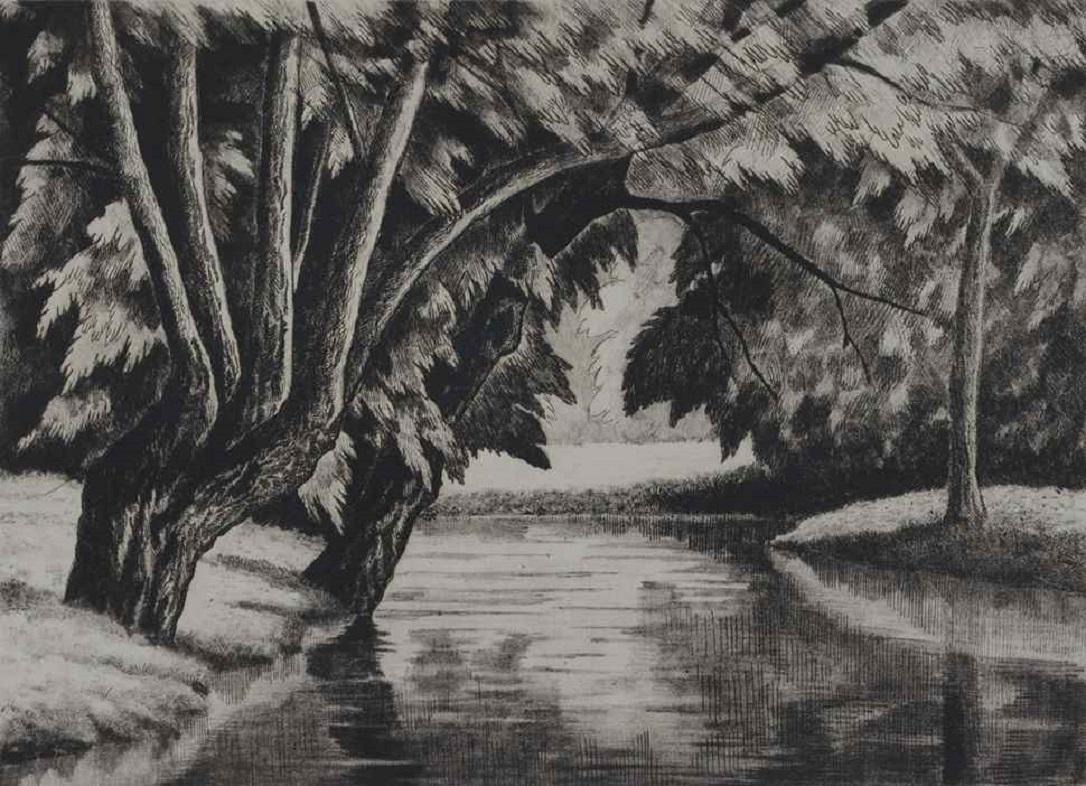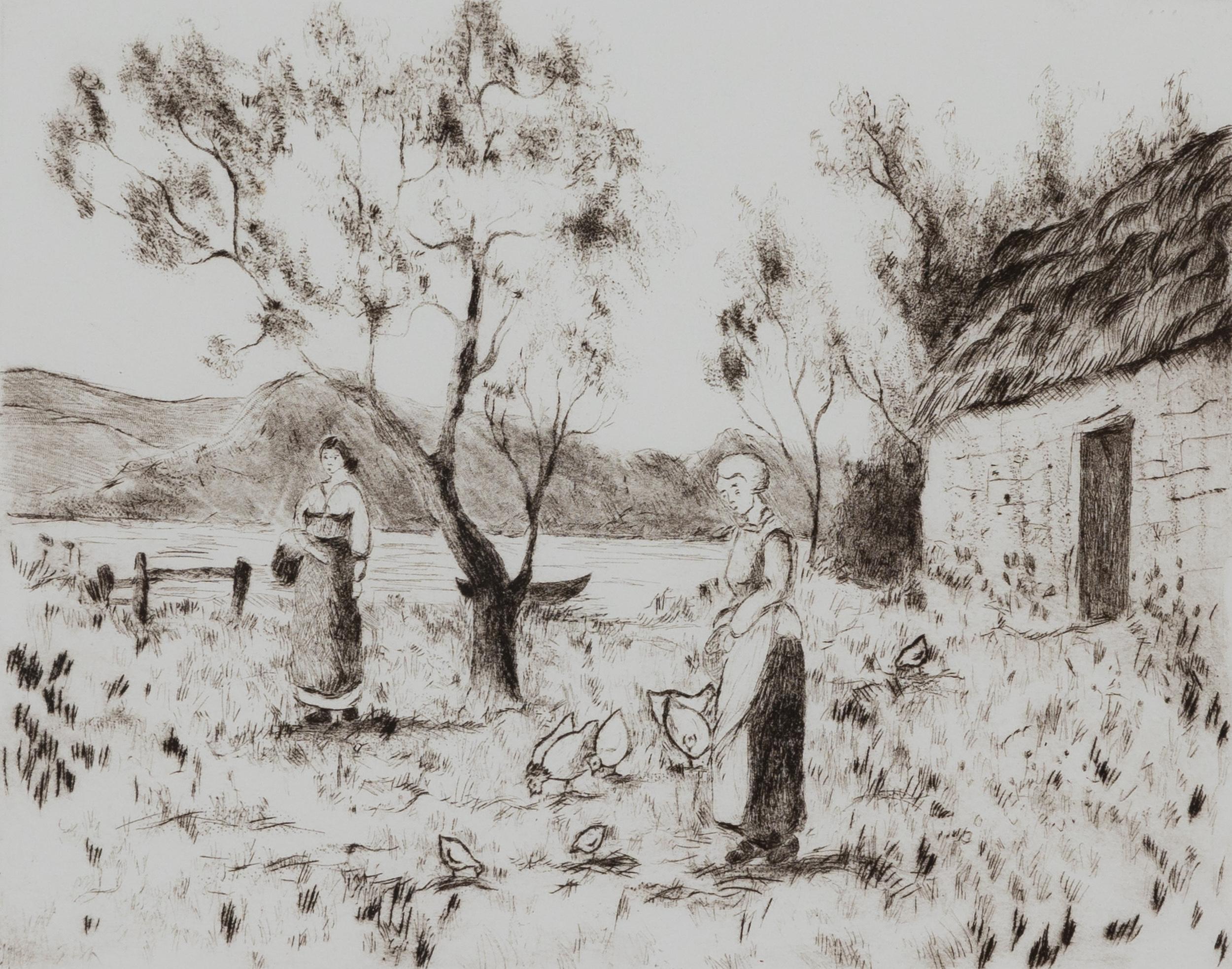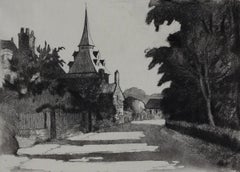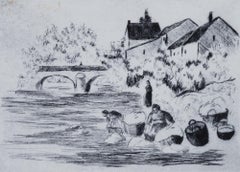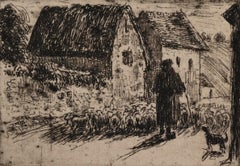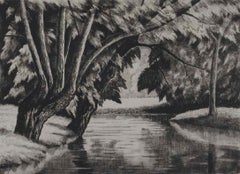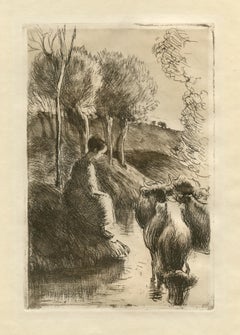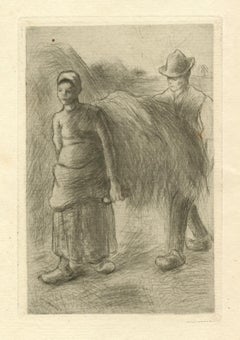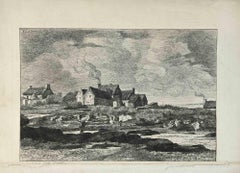Items Similar to Chaumière à Cantepie (Calvados), Etching by Paulémile Pissarro
Want more images or videos?
Request additional images or videos from the seller
1 of 3
Paulémile PissarroChaumière à Cantepie (Calvados), Etching by Paulémile Pissarro
$650
£502.75
€572.35
CA$933.30
A$1,019.65
CHF 534.40
MX$12,174.99
NOK 6,762.93
SEK 6,306.29
DKK 4,274.54
About the Item
SOLD UNFRAMED
Chaumière à Cantepie (Calvados) by Paulémile Pissarro (1884-1972)
Etching
19.5 x 24.3 cm (7 ⅝ x 9 ⅝ inches)
Signed Paulémile-Pissarro, numbered 38/50 and titled lower left; signed again lower right
Provenance
Private Collection, London
Artist biography
Paulémile Pissarro, Camille Pissarro’s youngest son, was born in Éragny in 1884 where he was brought up within the creatively fertile environment of his family home and, encouraged by his father, began drawing at an early age. Paulémile’s godfather was Claude Monet, who became his teacher and legal guardian after Camille’s death in 1903.
In 1905 Paulémile exhibited at the Salon des Indépendants for the first time. Although his father had supported Paulémile’s desire to be an artist, his mother was eager for him to learn a more practical trade. Therefore in 1908 he put aside his artistic pursuits to work as an automobile mechanic and test-driver, then later as a lace and textile designer, allowing him only a limited time to paint. Paulémile only fully dedicated himself to painting following a letter from his brother Lucien in London, who wrote to invite him to take part in an exhibition held in London. Subsequent to the successful sale of a number of watercolours he had sent over, the young artist became inspired to leave the textile factory and pursue a career in art.
By the 1920s Paulémile had become an established Post-Impressionist artist in his own right, spending the summer months escaping from Paris on painting trips with fellow artists Kees Van Dongen, Raoul Dufy, Maurice de Vlaminck and André Dunoyer de Segonzac. In 1922 Paulémile purchased a house in Lyons-la-Forêt, a small village within the region of his hometown of Éragny and Giverny, where he moved in with his first wife Berthe Bennaiche. During this time, he developed a form of Cubism inspired by Paul Cézanne whom he dearly admired, creating some wonderful paintings of the river Eure and its surrounding villages. There he formed a close friendship with his neighbour, the famous Art Deco designer Émile-Jacques Ruhlmann, who designed a stunning Art Deco studio for Paulémile adjacent to his house.
In 1930 he visited and fell in love with the Swiss Normandy area in the Calvados region, in particular the River Orne which runs through the valley adjacent to the villages of Clécy and St. Remy. The combination of rolling hills, bold meadows and the calm river weaving its way through the landscape offered Paulémile a new burst of inspiration. With his second wife Yvonne Beaupel, Paulémile eventually moved to Clécy in 1935, where he would remain for the rest of his life. Of their three children, both H. Claude and Yvon also became artists.
With his house backing on to the river Orne, Paulémile developed a new way of working using a boat as a floating studio, where he spent countless days painting the calm waters from between the riverbanks. Here the influence of his godfather Claude Monet became apparent, particularly in Paulémile’s depiction of water, which was revolutionised by the Impressionist icon. He also applied Monet’s lessons in horticulture to the creation of an abundant garden, offering him many more motifs for his new paintings. Alongside these river landscapes, he also painted the neighbouring hay fields, various snow scenes, some interiors and still lives. The most ambitious work in his oeuvre was a fresco painted on all four walls of his own dining room, depicting the adjacent river in which he includes family members, neighbours and friends.
In 1967 Paulémile had his first one-man show in the United States at Wally Findlay Galleries in New York. This led to widespread recognition and a degree of professional success that few Pissarro artists knew during their lifetime. Since his death in 1972, Paulémile remains one of the best known of Camille’s sons.
- Creator:Paulémile Pissarro (1884 - 1972, French)
- Dimensions:Height: 7.68 in (19.5 cm)Width: 9.57 in (24.3 cm)
- Medium:
- Movement & Style:
- Period:
- Condition:
- Gallery Location:London, GB
- Reference Number:1stDibs: LU261213961042
About the Seller
5.0
Recognized Seller
These prestigious sellers are industry leaders and represent the highest echelon for item quality and design.
Established in 1964
1stDibs seller since 2015
104 sales on 1stDibs
Typical response time: <1 hour
Associations
Society Of London Art Dealers
- ShippingRetrieving quote...Shipping from: London, United Kingdom
- Return Policy
More From This Seller
View AllLe Village de Landel by Paulémile Pissarro - etching
Located in London, GB
SOLD UNFRAMED
Le Village de Landel by Paulémile Pissarro (1884 - 1972)
Etching
17.2 x 23.7 cm (6 ¾ x 9 ⅜ inches)
Signed lower right, Paulémile-Pissarro and numbered lower left, 2e e...
Category
20th Century Post-Impressionist Landscape Prints
Materials
Etching
Lavandières by Lélia Pissarro - Figurative etching
By Lelia Pissarro
Located in London, GB
Lavandières by Lélia Pissarro (b. 1963)
Etching
12 x 15.5 cm (4 ³/₄ x 6 ¹/₈ inches)
Signed lower left, Lélia Pissarro.
Numbered lower right, 14/15
Artist biography:
Born in Paris i...
Category
1990s Figurative Prints
Materials
Etching
La rentrée du Berger by Camille Pissarro - Etching
By Camille Pissarro
Located in London, GB
La rentrée du Berger by Camille Pissarro (1830-1903)
Etching
7.6 x 10.9 cm (3 x 4 ¹/₄ inches)
Stamped with initials C.P. lower left, and numbered 13/18 lower right
This work was crea...
Category
1880s Impressionist Landscape Prints
Materials
Etching
Jardin de la Villa à Brantôme by Paulémile Pissarro - Etching Print
Located in London, GB
Jardin de la Villa à Brantôme by Paulémile Pissarro (1884 - 1972)
Etching
20.5 x 28.5 cm (8 ⅛ x 11 ¼ inches)
Signed lower right, Paulémile Pissarro and numbered lower left, 6e etat N...
Category
20th Century Landscape Prints
Materials
Etching
Charlotte and Amalia by Lélia Pissarro - Etching
By Lelia Pissarro
Located in London, GB
Charlotte and Amalia by Lélia Pissarro (b. 1963)
Etching
22.7 x 27.5 cm (9 x 10 ⁷/₈ inches)
Signed lower left, Lélia Pissarro
Numbered lower right, 2/15
Artist biography:
Born in P...
Category
1990s Post-Impressionist Figurative Prints
Materials
Etching
Paysage à Asquins by Paulémile Pissarro - Wood Engraving Print
Located in London, GB
SOLD UNFRAMED
Paysage à Asquins by Paulémile Pissarro (1884 - 1972)
Wood engraving
9.7 x 15.5 cm (3 ⁷/₈ x 6 ¹/₈ inches)
Signed lower right, Paulémile-Pissarro, titled and numbered ...
Category
20th Century Landscape Prints
Materials
Wood, Engraving
You May Also Like
"Vachere au Bord de l'Eau" original etching on japon paper
By Camille Pissarro
Located in Henderson, NV
Medium: original etching and drypoint. This rare and beautiful impression on japon paper is one of 50 printed for the deluxe edition of the Gazette des Beaux Arts. Published in Paris...
Category
1890s Impressionist Prints and Multiples
Materials
Etching
"Paysans portant du foin" original etching
By Camille Pissarro
Located in Henderson, NV
Medium: original etching and drypoint. Catalogue reference Delteil 126. Printed on laid paper in 1900 and published in Paris by Henri Floury as the frontispiece for Gustave Geffroy's...
Category
Early 1900s Impressionist Prints and Multiples
Materials
Etching
19th century black and white etching aquatint outdoors figurative animal print
By Camille Pissarro
Located in Milwaukee, WI
"Vachere au Bord de L'Eau" is an original etching and aquatint by Camille Pissarro, the 8th state. It can be found in the catalogue raisonne Delteil #93. It features a woman sitting ...
Category
1890s Realist Figurative Prints
Materials
Etching, Aquatint
The Village - Etching by Xavier de Damanche - Late 19th Century
Located in Roma, IT
The Village is a print on paper realized by Xavier de Damanche in the late 19th Century.
Etching on paper
Good conditions with slight foxing and cutting
Category
Late 19th Century Modern Figurative Prints
Materials
Etching
Le Soir au Village - Etching by Otto Weber - 1860s
Located in Roma, IT
Le Soir au Village is a black and White etching realized by Otto Weber in the 1860s.
Titled in the lower
Image Size: 26x32
Very good impression.
Realized for the "Société des Aq...
Category
1860s Modern Figurative Prints
Materials
Etching
Village de Tremereuc - Etching by Michel-Amédée Besnus - 1860s
Located in Roma, IT
Village de Tremereuc is a black and White etching realized by Michel-Amédée Besnus in the 1860s.
Titled in the lower.
Image size: 23x32.
Very good impression with wide margins an...
Category
1860s Modern Figurative Prints
Materials
Etching
More Ways To Browse
Les Cavaliers
Marc Chagall Lithograph Circus
Mark Morris
Matisse Dance
Matisse Lithograph Blue
Numbers Pop Art
Peintre Et Modele
Peter Max Liberty
Piranesi Veduta
Poster Israel
Radiant Baby
Ramon Aguilar More
Renoir Etching
Robe Feather
Robert Indiana Silkscreen
Rodo Graciela Boulanger
Romare Bearden Signed
Salvador Dali Dante
